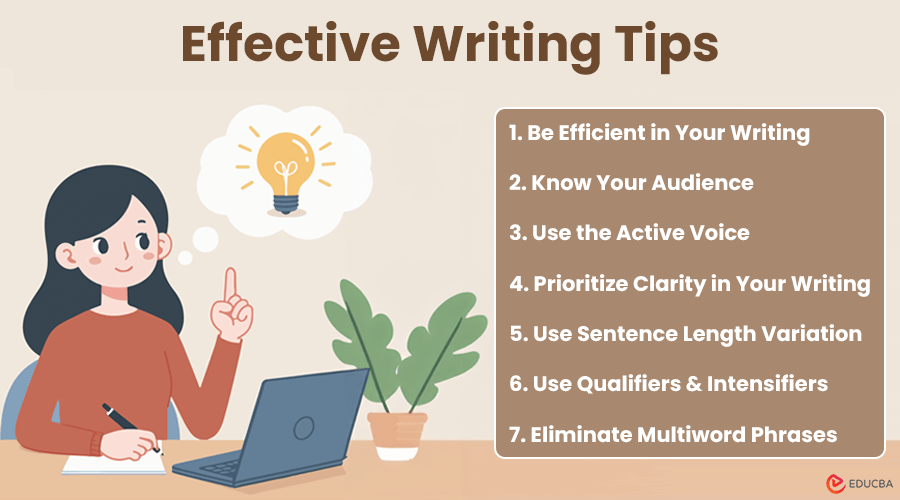
Introduction to Effective Writing Tips
Effective writing means conveying ideas clearly and efficiently, making it easy for readers to understand and engage with the text.
For example, instead of writing: “The rain was so heavy that it obscured everything in sight”.
You can write this: “The heavy rain made it hard to see”.
Effective writing also involves strategically using language, structure, and stylistic elements to ensure readers understand and appreciate the writing. This article will discuss effective writing tips that will attract any audience.
Importance of Effective Writing Skills
Here are some key importance of effective writing skills:
#1. Encourages Clear Communication
Clear writing skills are essential for anyone who wants to be socially active and successful in their career. Effective writing ensures that others easily understand you.
This is especially true in online work and study environments where communication often takes place through emails or shared Google Docs. Therefore, it is crucial to write grammatically correctly and concisely.
#2. Helps Increase Academic Success
Clear writing skills directly enhance academic performance for students. Essays and other academic papers are a significant part of their coursework, and the quality of their writing can impact their GPA.
Students who struggle with writing can seek help from writing services. By requesting, “Write my essay online,” they can avoid issues with their grades and gain more confidence in their writing. Collaborating with professional writers also offers an opportunity to learn how to craft clear and concise sentences, ultimately improving their writing skills.
#3. Builds Professional and Personal Branding
Many people maintain blogs on social media to share their thoughts or to build their professional reputation. In an expert blog, the clarity and correctness of your writing reflect your level of education and significantly influence your reputation. Well-written posts enhance your credibility and professional image.
7 Effective Writing Tips
Here are some effective writing tips:
#1. Be Efficient in Your Writing
Writing efficiently means getting your point across with as few words as possible. Cut out unnecessary phrases and be direct.
Being concise makes your message clearer and more impactfulIt. It helps your audience understand what you are saying more easily.
Example:
Instead of saying: “In order to ensure that our project is completed on time, it is imperative that we allocate sufficient resources and manpower to the task.”
You can write: “To finish the project on time, we need enough resources and manpower.”
#2. Know Your Audience
Effective writing involves understanding your audience. Successful authors and writers identify their main readers and tailor their language accordingly.
For instance, writing for professionals requires technical terms specific to their industry. However, when writing for a general audience, it is important to avoid technical jargon.
Example:
For Professionals:
Rather than referring to “blood pressure measurement,” it is more appropriate to use the term “systolic and diastolic pressure readings.”
For General Audience:
Instead of using medical terms such as “systolic and diastolic,” opt for simpler language like “blood pressure.”
#3. Use the Active Voice
Instead of using passive constructions, use active sentences where the subject performs the action. This makes your writing more engaging as your message is clear.
Example:
Instead of saying: “The report was written by the team.”
You can write: “The team wrote the report.”
#4. Prioritize Clarity in Your Writing
To prioritize clarity, use words that a layman can fully understand. While advanced vocabulary can be impressive, it is important to ensure that simpler words fit the context.
So, if a simpler synonym is available, use it. Remember that clear communication is key, so avoid unnecessary complexity that might confuse your readers.
Example:
Instead of “utilize,” you can use “use.”
#5. Use Sentence Length Variation
Varying sentence length is a powerful tool in effective writing. It keeps the reader engaged by creating a natural rhythm and flow. Short sentences can convey impact and clarity, while longer sentences provide depth and complexity.
By alternating between short and long sentences, writers can maintain the reader’s interest and effectively communicate their ideas. This variation adds texture to the writing by making it more dynamic and compelling.
Example:
Short sentence: “The sun rose.”
Long sentence: “The world woke at sunrise as the sky filled with orange and pink hues, embracing the gentle warmth of a new day.”
#6. Use Qualifiers and Intensifiers Thoughtfully
Thoughtful use of qualifiers and intensifiers can make your writing more accurate and powerful.
Qualifiers like “some,” “many,” or “often” add depth by showing how much something is true. Intensifiers such as “extremely,” “absolutely,” or “completely” make your statements stronger.
However, it’s important to use them wisely. Using too many qualifiers can weaken your arguments, and using too many intensifiers might make you seem insincere or exaggerated.
Example:
Qualifier Example: “Some researchers suggest that regular exercise can improve cognitive function.”
Intensifier Example: “The new policy has completely transformed our company’s approach to sustainability.”
#7. Eliminate Multiword Phrases
It is important to watch for long phrases that clutter your writing. They are often unnecessary and can confuse readers, so simplifying them is key to getting your message across clearly.
You can improve clarity and coherence in your writing by eliminating them or replacing them with simpler alternatives.
Example:
Original: “In the midst of the current economic downturn, it is incumbent upon us to engage in proactive measures to mitigate adverse effects on our organization’s financial stability.”
Simplified: “During the economic downturn, we must take proactive steps to protect our organization’s financial stability.”
Final Thoughts
Hope these effective writing tips were helpful in guiding you towards clearer, more impactful communication. Adhering to these principles can streamline your writing process and convey your ideas more clearly and confidently.
Remember, practice makes perfect, so continue implementing these techniques and watch your writing evolve into a powerful tool for conveying your thoughts and connecting with your audience.
Recommended Articles
Are you looking to enhance your writing skills further? Check out these recommended articles on effective writing tips.
